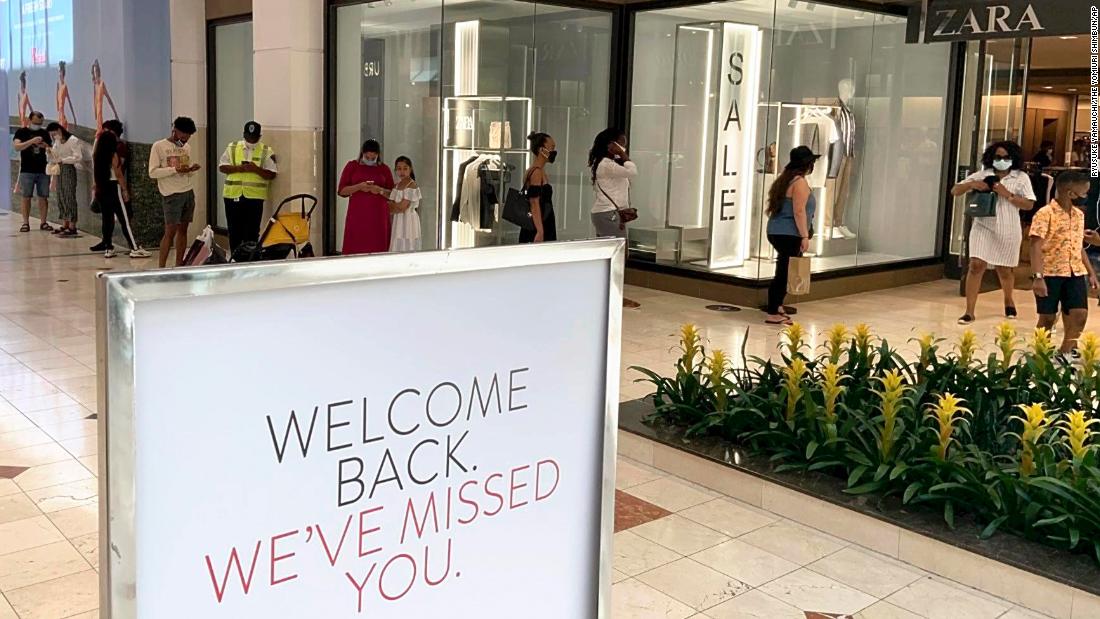
US retail sales rose 1.2% in July from the previous month, the Commerce Department reported Friday.
Initially, Wall Street wasn't impressed with the data. Stocks fell in morning trading after the number fell short of economists' forecasts.
But lurking in the report was a bright spot.
After slumping to a seven-year low in April, retail sales bounced back to their pre-pandemic level in just a few months. As of July, they were at their highest level on record.
The milestone came in part because the Commerce Department revised June's retail sales figures higher.
Consumer spending is the biggest engine of US economic growth, and retail sales are an important component of that. The report, however, does not include spending on services — things like hair cuts, medical care and financial services. So far, spending on retail goods has recovered at a faster rate than spending on services.
The retail rebound has been driven by a few strong categories.
Compared with July last year, sales were up 24.7% at "nonstore retailers," a sector that includes ecommerce platforms. Sales were also strong at building and garden supply retailers, grocery stores and stores that sell sporting goods, hobby supplies and musical instruments.
Meanwhile, the report showed gas stations, department stores and clothing retailers are still operating far below normal.
Overall, the data signals that, despite rising coronavirus cases and a bruised US economy, consumers are still spending — even if the ways they're spending have shifted.
"The retail sales figures are encouraging because they suggest the recovery has continued to grind on even in the face of the resurgence in virus cases," Michael Pearce, senior US economist at Capital Economics, said in a research note Friday.
Slower momentum ahead
Despite reaching a pre-crisis milestone, retail sales could slow in the months ahead, economists warn. July's 1.2% gain already was significantly slower than the 8.4% gain in June.
The federal government's stimulus package and enhanced unemployment benefits of an additional $600 a week have boosted retail sales, economists say. But the enhanced benefits expired at the end of July, which could cause the recovery could stall, they say.
"Given continued high unemployment, retail sales in August and in the fall will rely to a large degree on the timing and extent of more government assistance," Robert Frick, corporate economist at Navy Federal Credit Union, said in a note Friday.
The pandemic has slammed parts of the retail industry and forced a growing list of brands into bankruptcy.
So far in 2020, more than 6,000 stores have said they will permanently close, according to Coresight Research, a retail research and advisory firm. It anticipates closures will snowball and set a new annual record this year of as many as 25,000, breaking last year's record 9,302 closures tracked by the firm.
Discount retailer Stein Mart filed for bankruptcy this week and plans to close most of its nearly 300 stores.
Stein Mart joins several other retailers have fallen into bankruptcy in recent months, including Tuesday Morning, JCPenney, Sur La Table and Muji. Pier 1 Imports, which filed for bankruptcy in February and is closing all of its stores, announced in July it found a buyer for its online operations and intellectual property.
"that" - Google News
August 15, 2020 at 01:16AM
https://ift.tt/3kOUW0e
American shopping is back to pre-pandemic levels. That's a big deal - CNN
"that" - Google News
https://ift.tt/3d8Dlvv

Tidak ada komentar:
Posting Komentar